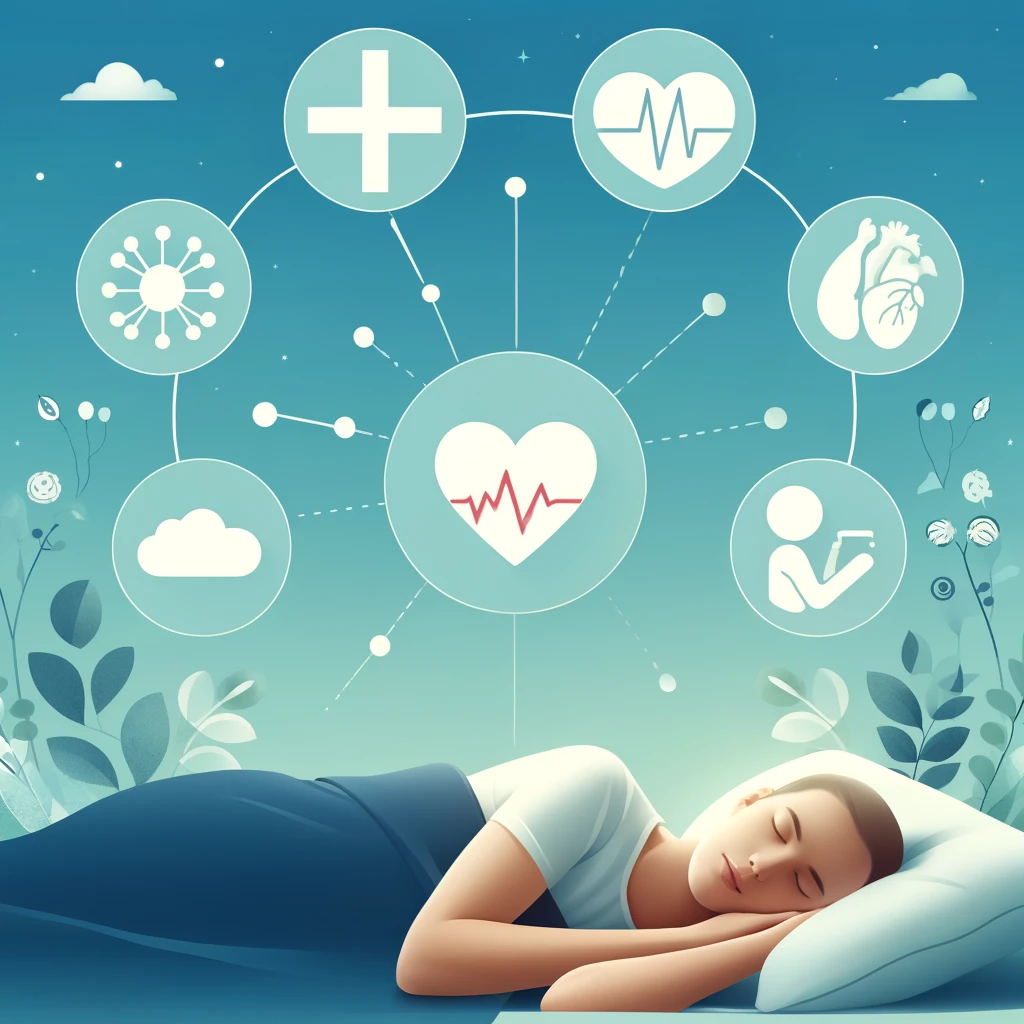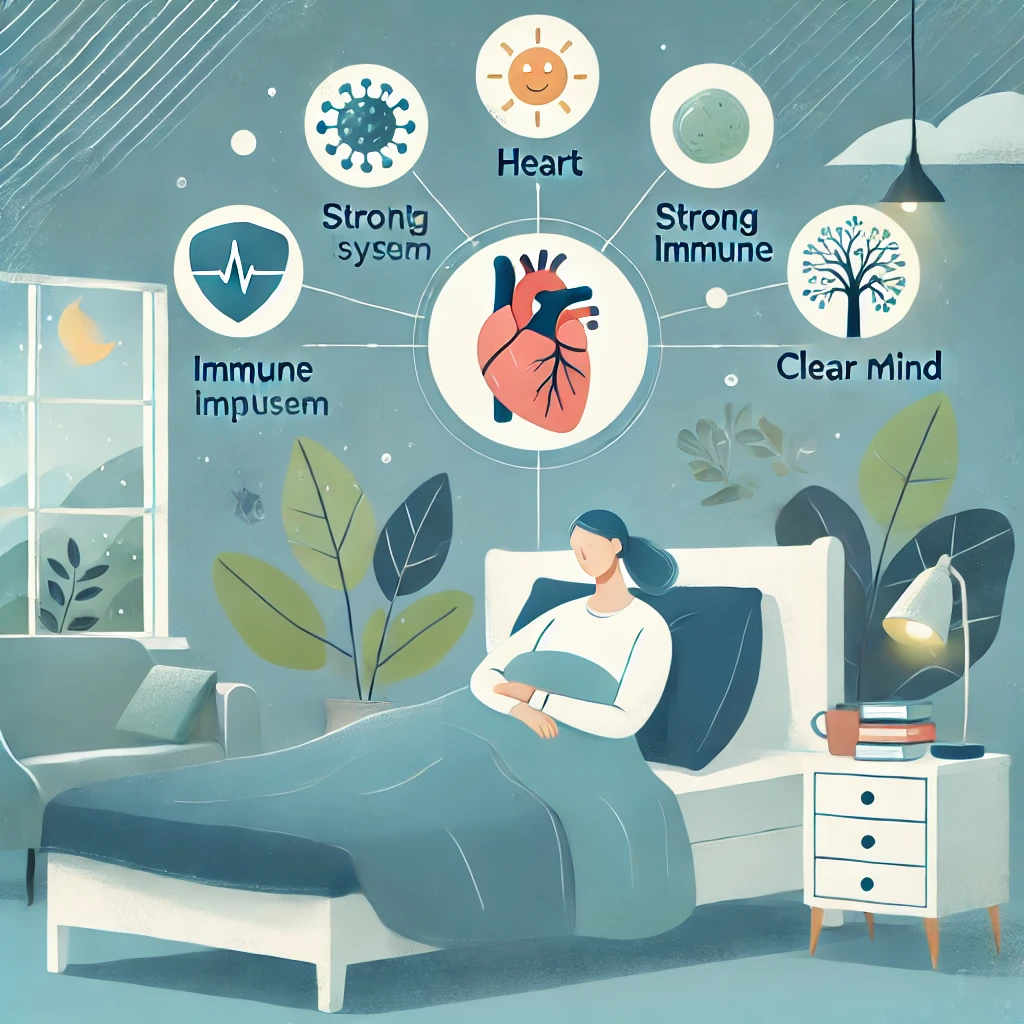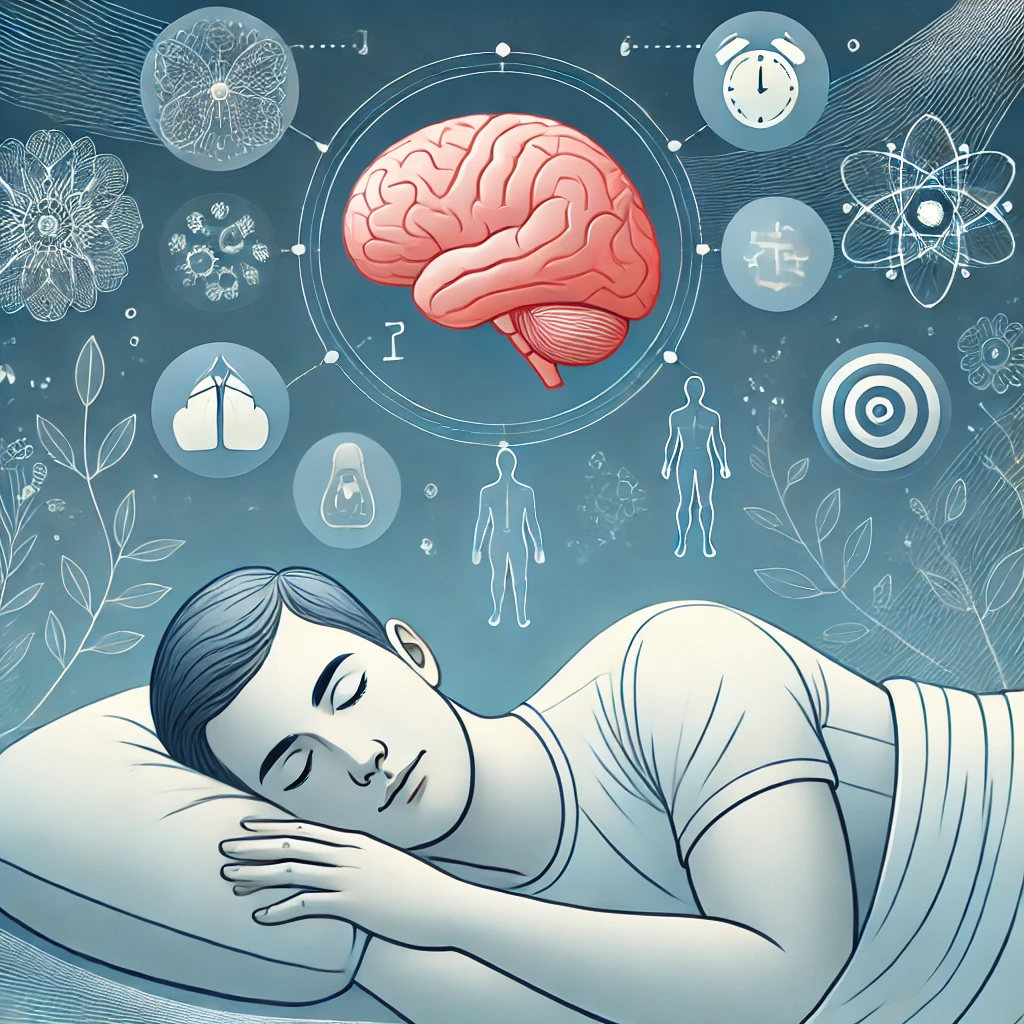“Finish each day before you begin the next, and interpose a solid wall of sleep between the two.”
Ralph Waldo Emerson
American essayist, lecturer, philosopher, abolitionist, and poet
American adults report sleeping fewer
than seven hours per night
Adults in the U.S. are affected by sleep disorders
of U.S. adults experience insomnia
Of Adults unintentionally nod off during the day at least once in the past month
Introduction
We all know how great it feels to wake up refreshed after a good night’s sleep. But with the stresses of daily life, quality sleep can be hard to achieve. The good news? A few simple changes can make a big difference. Read on to learn about the essentials of sleep—what it is, why it matters, and how to improve it. Whether you want more energy, better focus, or just to feel your best, getting the right amount of quality sleep is the key. Let’s get started on your path to better sleep!
The Science of Sleep: Understanding Its Phases and Functions
What is Sleep?
Sleep is a natural, restorative process divided into two main categories: Non-Rapid Eye Movement (NREM) and Rapid Eye Movement (REM) sleep. Each plays a crucial role in maintaining your health. NREM sleep includes three stages, ranging from light to deep sleep, and is primarily responsible for physical recovery. During REM sleep, your brain is highly active, processing emotions, consolidating memories, and supporting cognitive functions.
The Four Stages of Sleep
- **1** **Stage 1 (NREM)**: The transition from wakefulness to sleep. During this light sleep stage, your muscle activity slows, and you begin to relax.
- **2** **Stage 2 (NREM)**: Your heart rate slows, and body temperature drops. This stage is essential for preparing your body for deeper sleep.
- **3** **Stage 3 (NREM)**: Also known as deep sleep or slow-wave sleep, this stage is vital for physical recovery, immune function, and cellular repair.
- **4** **Stage 4 (REM)**: The dreaming stage, where emotional and cognitive restoration occurs. Your brain is active, helping to process emotions and solidify memories.
Understanding Circadian Rhythms
Your circadian rhythm is your body’s internal clock, regulating sleep-wake cycles over a 24-hour period. This rhythm is influenced by light and darkness, which signals to your brain when it’s time to
wake up or go to sleep. Disrupting this natural rhythm—due to irregular sleep schedules (jet lag, or exposure to blue light from screens are prime examples)—can lead to sleep disorders and negatively
impact your overall health.
The Benefits of Quality Sleep
Quality sleep is not just restorative; it’s transformative. It enhances both mental and physical health, making it an indispensable part of a healthy lifestyle. Here’s why:
- **Improved Cognitive Function**: Sleep boosts memory, learning, focus, and decision-making. REM sleep, in particular, helps your brain process information, solve problems, and consolidate knowledge.
- **Emotional Stability**: Sleep plays a crucial role in regulating emotions, reducing anxiety and stress, and promoting a balanced mood. Consistent REM sleep is vital for maintaining mental health.
- **Physical Recovery**: Deep sleep is when your body repairs tissues, builds muscle, and strengthens the immune system. Growth hormone production peaks during this stage, aiding in recovery from physical activity.
- **Enhanced Immune Function**: A well-rested body is better at fighting off infections. During sleep, your immune system releases proteins called cytokines, which help target infection and inflammation.
- **Longevity and Disease Prevention**: Consistent quality sleep is linked to a longer lifespan and a reduced risk of chronic diseases such as heart disease, diabetes, and neurodegenerative conditions like Alzheimer’s.
The Danger of Poor Sleep Discipline
Neglecting sleep can lead to serious health consequences, affecting nearly every system in your body. Here are some of the risks associated with poor sleep discipline:
- **Cognitive Impairment**: Sleep deprivation diminishes your ability to concentrate, remember information, and make decisions. Even one night of poor sleep can impair cognitive function. **Emotional Instability**: Lack of sleep disrupts neurotransmitter balance, leading to heightened anxiety, irritability, and mood swings. Chronic sleep loss is strongly associated with mental health disorders like depression.
- **Weakened Immune System**: Inadequate sleep weakens your immune response, making you more susceptible to infections and slowing recovery from illness. It can also reduce the effectiveness of vaccines.
- **Increased Risk of Chronic Diseases**: Chronic sleep deprivation is linked to a higher risk of developing conditions such as obesity, type 2 diabetes, cardiovascular disease, and certain cancers. Poor sleep disrupts metabolic function, leading to weight gain and insulin resistance. **Higher Accident Risk**: Sleep deprivation slows reaction times and impairs judgment, significantly increasing the risk of accidents, particularly while driving. Studies show that driving while sleep-deprived can be as dangerous as driving under the influence of alcohol.
Improving Your Sleep: Practical Tips & Strategies
Achieving better sleep requires a combination of understanding the science of sleep and implementing practical lifestyle changes. Here’s how you can start improving your sleep today:
- **Aim for 7-9 Hours of Sleep**: Most adults need between 7-9 hours of sleep each night for optimal health. Find the amount that works best for you and stick to it. Consistency is key!
- **Create a Consistent Sleep Schedule**: Go to bed and wake up at the same time every day, even on weekends, to keep your circadian rhythm aligned.
- **Optimize Your Sleep Environment**: Your bedroom should be cool (60-67°F), dark, and quiet. Consider using blackout curtains or a white noise machine to create the perfect sleep sanctuary. **Limit Sleep Disruptors**: Avoid caffeine, alcohol, and heavy meals close to bedtime, as these can interfere with deep sleep and REM sleep.
- **Incorporate Relaxation Techniques**: Engage in calming activities before bed, such as reading, meditation, or light stretching. This helps signal to your body that it’s time to sleep.
- **Monitor Your Sleep Patterns**: Use a sleep journal or a wearable device to track your sleep habits and identify areas for improvement.
Summary
Good sleep is the cornerstone of health and well-being. By understanding the stages of sleep, the role of circadian rhythms, and the consequences of poor sleep, you can take meaningful steps toward improving your sleep habits. Prioritize consistent, high-quality sleep by creating a supportive environment, aligning your schedule with your natural rhythms, and avoiding habits that disrupt restorative rest.
Remember, small changes in your sleep routine can lead to significant improvements in how you feel and function. The journey to better sleep starts with a single step—take it today and experience the transformative power of quality sleep.
If you’re interested in delving deeper into the science and learning practical strategies for improving your sleep, We invite you to join strongerhealthspan.com. As a member, you’ll gain access to exclusive content, expert advice, and a comprehensive guide to mastering your sleep for a healthier, happier life.
Matthew Walker is known for his extensive research on the impact of sleep on human brain function, health, and disease. He has published over 100 scientific research studies and is the author of the bestselling book “Why We Sleep”

Matthew Walker
UC, Berkeley
Emmanuel Mignot is renowned for his discovery of the cause of narcolepsy, identifying that it is caused by an immune-mediated destruction of hypocretin (orexin) neurons in the hypothalamus. His work has significantly advanced the understanding and treatment of sleep disorders

Emmanuel Mignot
Stanford
Masashi Yanagisawa is famous for discovering the neuropeptide orexin, which regulates sleep and wakefulness. His research has led to new treatments for narcolepsy and has provided deep insights into the mechanisms of sleep regulation

Masashi Yanagisawa
U of Tsukuba
Elizabeth Klerman’s research focuses on the application of circadian and sleep research principles to both normal and pathological states, as well as mathematical modeling of human circadian rhythms and sleep

Elizabeth Klerman
Harvard Medical
David Raizen’s research centers on the fundamental mechanisms regulating sleep and fatigue, contributing significantly to the understanding of sleep biology

David M. Raizen
U of Pennsylvania
Michael Perlis is known for his work in Behavioral Sleep Medicine, particularly in the development and dissemination of cognitive-behavioral therapy for insomnia (CBT-I)

Michael L. Perlis
U of Pennsylvania
Frequently Asked Questions
Answer: The amount of sleep needed varies by age and individual health. On average:
Newborns (0-3 months): 14-17 hours
Infants (4-11 months): 12-15 hours
Toddlers (1-2 years): 11-14 hours
Preschoolers (3-5 years): 10-13 hours
School-age children (6-13 years): 9-11 hours
Teenagers (14-17 years): 8-10 hours
Adults (18-64 years): 7-9 hours
Older adults (65+ years): 7-8 hours It’s important to listen to your body and adjust your sleep accordingly.
Answer: Sleep deprivation can have both short-term and long-term effects on your health. Short-term effects include impaired concentration, memory problems, and mood swings. Long-term sleep deprivation can lead to more serious health issues such as:
Increased risk of cardiovascular diseases
Diabetes
Obesity
Weakened immune system
Mental health disorders such as depression and anxiety
Decreased life expectancy
Answer: Improving sleep quality involves adopting good sleep hygiene practices:
Stick to a regular sleep schedule by going to bed and waking up at the same time every day.
Create a relaxing bedtime routine, such as reading or taking a warm bath.
Ensure your sleep environment is comfortable, quiet, and dark.
Limit exposure to screens and electronic devices at least an hour before bed.
Avoid caffeine, alcohol, and heavy meals close to bedtime.
Exercise regularly, but not too close to bedtime.
Answer: Common sleep disorders include:
Insomnia: Difficulty falling or staying asleep. Treatment options include cognitive behavioral therapy for insomnia (CBT-I), medications, and lifestyle changes.
Sleep Apnea: Interrupted breathing during sleep. Treatments include CPAP (Continuous Positive Airway Pressure) machines, oral appliances, and lifestyle changes like weight loss.
Restless Legs Syndrome (RLS): An uncontrollable urge to move the legs, usually at night. Treatments include medications, lifestyle changes, and managing underlying conditions.
Narcolepsy: Excessive daytime sleepiness and sudden sleep attacks. Treatments include medications, scheduled naps, and lifestyle adjustments.
Understanding and addressing these issues can lead to better sleep and overall health.
How Sleep Impacts Your Health: Connecting Sleep Quality and Life Quality

Sleep is more than just a period of rest; it is a critical function that significantly influences our overall health and quality of life. Understanding the profound impact of sleep on health can empower us to prioritize sleep and adopt habits that enhance its quality. In this blog post, we will explore how sleep affects…
Why Sleep Matters: The Critical Role of Sleep in Health and Well-being

Sleep is a fundamental aspect of our daily lives, yet its significance is often underestimated. Understanding the critical role sleep plays in health and well-being is essential for optimizing our overall quality of life. This blog post explores why sleep matters, highlighting its impact on various aspects of health and providing practical tips to improve…
Why Do We Sleep? The Biological and Psychological Perspectives

Sleep is a universal behavior that is essential for life. Despite decades of research, the precise reasons why we sleep are still being unraveled. This blog post will delve into both the biological and psychological perspectives of why sleep is so crucial for our well-being. The Biological Perspective of Sleep From a biological standpoint, sleep…
Understanding Sleep: A Comprehensive Guide to Its Science and Significance

Sleep is a fundamental component of human health, influencing various aspects of our physical, mental, and emotional well-being. Despite its crucial role, many people struggle to understand the intricacies of sleep and its impact on their lives. In this comprehensive guide, we will explore the science behind sleep, its significance, and practical tips for improving…